2020—2021学年七年级下册牛津译林英语Unit6 Outdoor fun Reading课件28张
文档属性
| 名称 | 2020—2021学年七年级下册牛津译林英语Unit6 Outdoor fun Reading课件28张 | 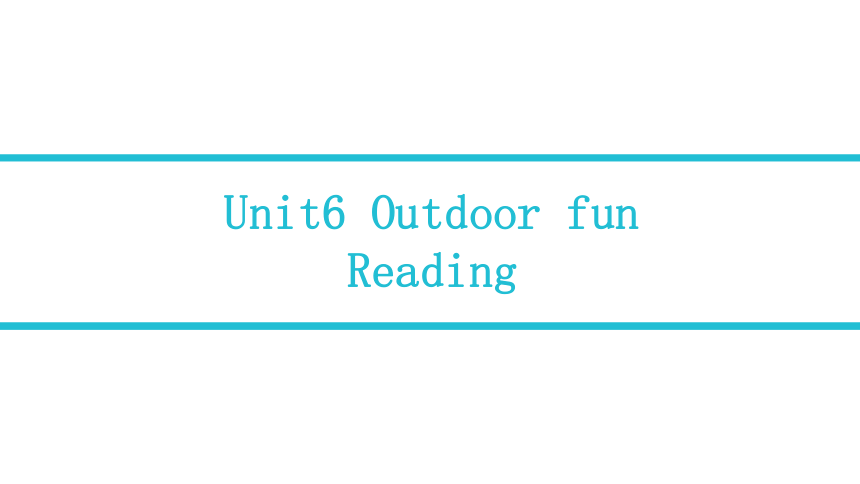 | |
| 格式 | zip | ||
| 文件大小 | 4.5MB | ||
| 资源类型 | 教案 | ||
| 版本资源 | 牛津译林版 | ||
| 科目 | 英语 | ||
| 更新时间 | 2021-04-26 20:33:32 | ||
图片预览

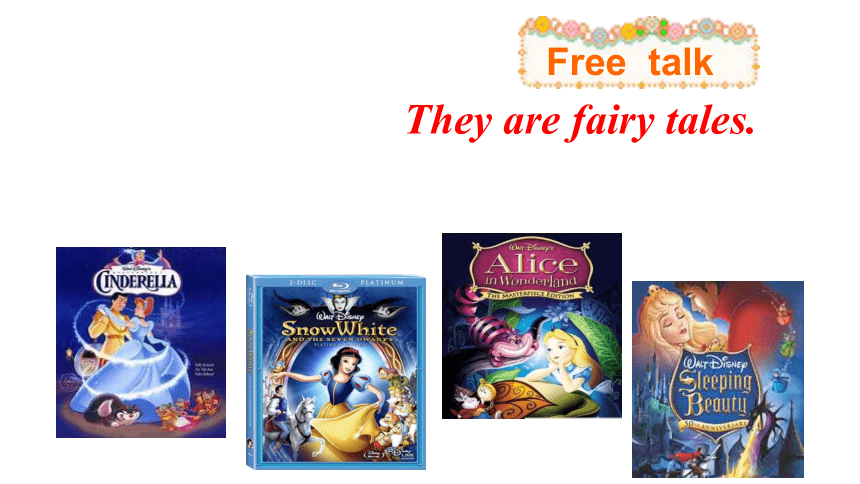
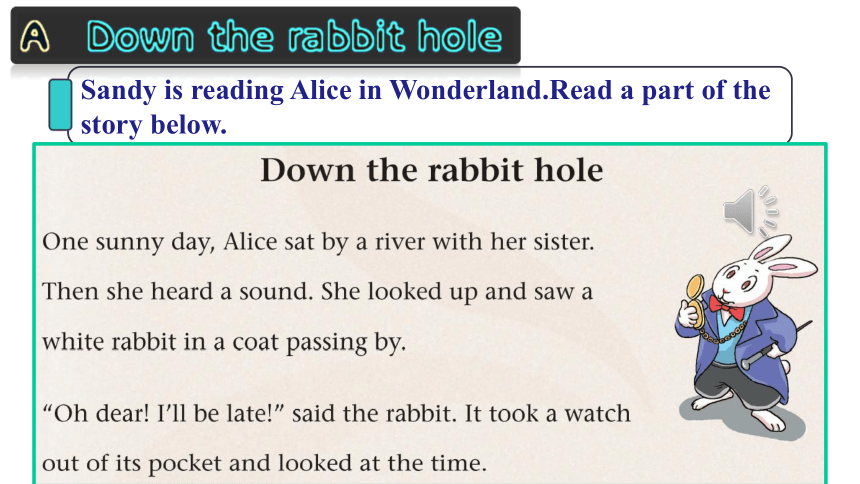

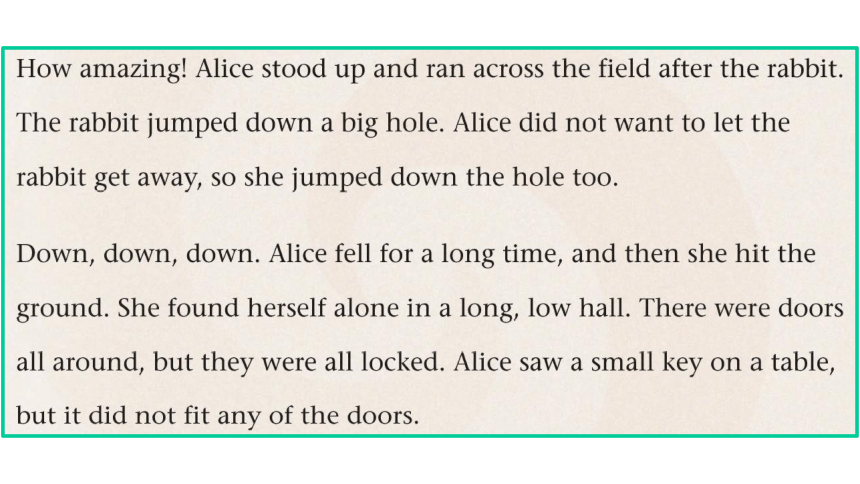
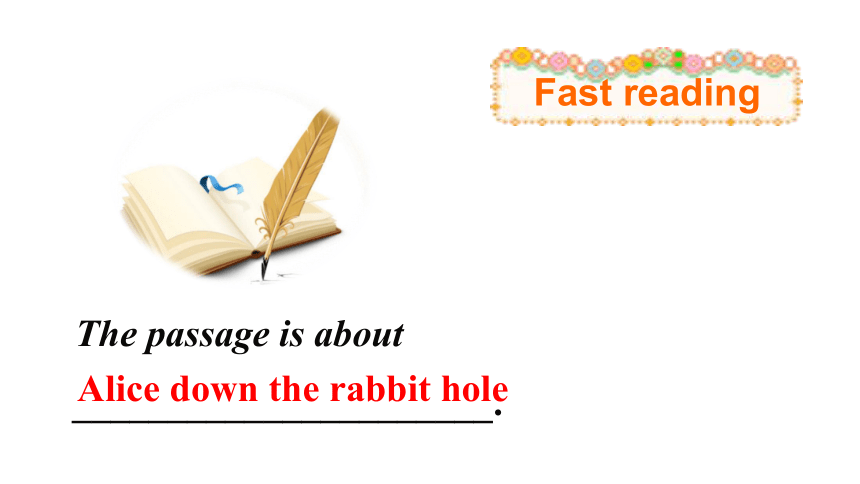
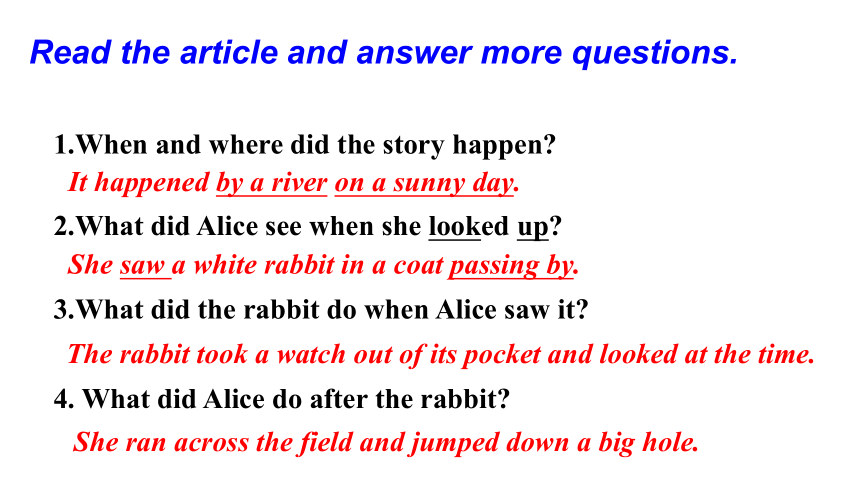
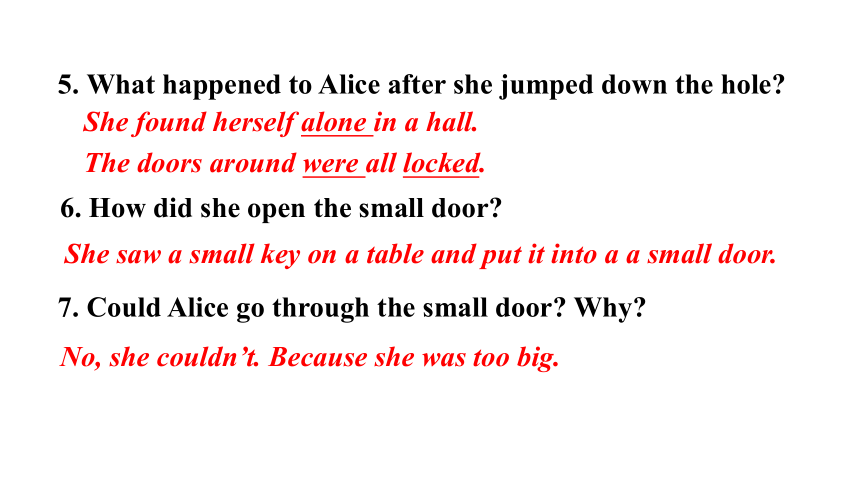
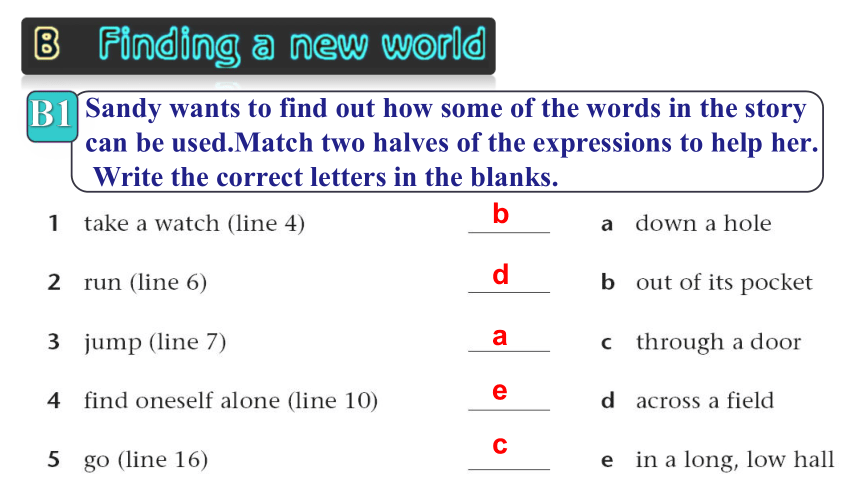
文档简介
(共28张PPT)
Unit6
Outdoor
fun
Reading
What
are
these?
Free
talk
Which
is
your
favourite?
They
are
fairy
tales.
Sandy
is
reading
Alice
in
Wonderland.Read
a
part
of
the
story
below.
Fast
reading
The
passage
is
about
______________________.
Alice
down
the
rabbit
hole
Read
the
article
and
answer
more
questions.
1.When
and
where
did
the
story
happen?
2.What
did
Alice
see
when
she
looked
up?
3.What
did
the
rabbit
do
when
Alice
saw
it?
It
happened
by
a
river
on
a
sunny
day.
She
saw
a
white
rabbit
in
a
coat
passing
by.
The
rabbit
took
a
watch
out
of
its
pocket
and
looked
at
the
time.
4.
What
did
Alice
do
after
the
rabbit?
She
ran
across
the
field
and
jumped
down
a
big
hole.
5.
What
happened
to
Alice
after
she
jumped
down
the
hole?
7.
Could
Alice
go
through
the
small
door?
Why?
She
found
herself
alone
in
a
hall.
The
doors
around
were
all
locked.
No,
she
couldn’t.
Because
she
was
too
big.
She
saw
a
small
key
on
a
table
and
put
it
into
a
a
small
door.
6.
How
did
she
open
the
small
door?
Sandy
wants
to
find
out
how
some
of
the
words
in
the
story
can
be
used.Match
two
halves
of
the
expressions
to
help
her.
Write
the
correct
letters
in
the
blanks.
B1
b
d
a
e
c
B2
Sandy
wrote
some
sentences
about
the
story,
but
they
are
not
in
the
correctorder.
Help
her
put
the
sentences
in
the
correct
order.
Write
the
numbers
1-8
in
theboxes.
1
8
3
6
7
5
2
4
B3
Simon
made
some
notes
about
the
story.Read
his
notes.
Write
a
T
if
asentence
is
true
or
an
F
if
it
is
false.
It
was
a
cloudy
day.
2.
Alice
was
playing
with
a
rabbit.
3.
The
rabbit
asked
Alice
the
time.
4.
The
rabbit
jumped
down
the
hole
first.
5.
It
took
Alice
a
long
time
to
hit
the
ground.
6.
Alice
talked
to
the
rabbit
in
the
hole.
F
F
F
T
T
F
B4
Simon
is
asking
Sandy
about
the
story
Alice
in
Wonderland.
Completetheir
conversation
with
the
words
in
the
box.
door
field
ground
hall
hole
key
pocket
rabbit
river
watch
Simon:
What’s
the
story
about?
Sandy:
It’s
about
a
girl.
Her
name
is
Alice.
One
day,
she
sat
by
a
_____
with
her
sister.
Then
she
saw
a
white
______.
river
rabbit
Simon:
What
did
the
rabbit
do?
Sandy:
The
rabbit
took
a
______
out
of
its
______
and
looked
at
the
time.
Simon:
What
happened
next?
Sandy:
The
rabbit
ran
across
a
_____.
Alice
ran
after
it.
Then
the
rabbit
and
Alice
both
jumped
into
a
____.
Simon:
What
happened
after
that?
Sandy:
Alice
hit
the
______.
Then
she
found
herself
alone
in
a
long
low
____.
She
saw
a
___
on
a
table
and
used
it
to
open
a
door.
watch
pocket
field
hole
ground
hall
key
Simon:
Did
she
go
through
the
____?
Sandy:
No,
she
didn’t.
It
was
too
small.
door
●1
look
up
抬头看
[观察]
She
looked
up
and
saw
a
white
rabbit
in
a
coat
passing
by.
她抬起头看见一只穿着外套的白兔经过。
She
looked
up
as
I
entered
the
room.
我进房间时她抬起头看了看。
词
汇
点
睛
[探究]
look
up是固定短语,意为“抬头看”。
[拓展]
(1)look
up还可译为“________”。
You
can
look
up
new
words
in
a
dictionary.
你可以在词典中查找生词。
查阅
(2)与look相关的短语:
look
at
看 look
after
照顾,照料
look
for
寻找
look
out
小心,当心
look
around
环顾四周
look
forward
to
期待
●2
fall
vi.
落下,掉落;倒
[观察]
Alice
fell
for
a
long
time,
and
then
she
hit
the
ground.
爱丽丝掉了很长时间,然后才落地。
The
cat
fell
into
a
hole.这只猫掉入了一个洞里。
[探究]
fall的过去式为________。常用短语:
fall
into
掉入
fall
off
从……滑落
fall
asleep入睡
fall
behind落后,掉队
fell
[拓展]
fall
还可作名词,意为“秋天;落下;瀑布”。
We
visited
the
Niagara
Falls
in
the
fall
of
2015.
我们在2015年秋天参观了尼亚加拉大瀑布。
I
had
a
fall
(from
a
horse)
and
broke
my
arm.
我(从马上)跌下来把胳膊摔断了。
●3
alone
adj.
&
adv.
独自,单独
[观察]
She
found
herself
alone
in
a
long,
low
hall.
她发现自己一个人在一个长而低的厅里。
You'd
better
not
go
alone.
你最好不要单独去。
[探究]
alone既可作形容词,也可作副词,意为“独自,单独”,侧重说明独自一人或一方,没有同伴或助手,相当于on
one's
own或by
oneself。
[辨析]
alone与lonely
(1)alone
作形容词,意为“独自,单独”,侧重说明独自一人或一方,没有同伴或助手,没有感彩,只表示客观的状态。在句中只能作表语,不能作定语。
(2)lonely
作形容词,意为“孤独的,寂寞的”,表示主观上感到孤独、寂寞,有较浓的感彩,在句中作表语或定语。作定语时,意为“荒凉的;偏僻的”,多修饰表示地点的名词。
He
is
alone,
but
he
doesn't
feel
lonely.
他独自一人,但并不感到孤独。
●1
It
took
a
watch
out
of
its
pocket
and
looked
at
the
time.
它从口袋里拿出一块手表看了一下时间。
[探究]
take…out
of意为“把……从……中拿出来”。
If
you
take
the
fish
out
of
the
water,
they
will
die
soon.
如果你把鱼从水里拿出来,它们很快就会死去。
句
型
透
视
[拓展]与take相关的短语:
take
away拿走 take
off起飞;脱下
take
down拆掉;记录
take
back收回
take
care
of照顾,照料
take
action采取行动
take
part
in
参加,加入
[探究]
(1)let
是使役动词,意为“让,使”,后接动词原形。let
sb.
do
sth.意为“让某人做某事”。
My
mother
lets
me
play
computer
games
on
Sunday
evening.
我妈妈让我星期天晚上玩电脑游戏。
●2
Alice
did
not
want
to
let
the
rabbit
get
away,
so
she
jumped
down
the
hole
too.
爱丽丝不想让兔子跑掉,所以她也跳进了洞里。
(2)get
away意为“逃脱;离开”。
Do
you
want
to
get
away
early
in
the
morning?
你想一大早就离开吗?
(3)句中so作连词,意为“因此,所以”,引导结果状语从句。
The
ship
was
late,
so
we
had
to
wait
for
twenty
minutes.
轮船晚点了,因此我们不得不等20分钟。
●3
Then
Alice
noticed
a
small
door
and
put
the
key
into
it.
然后爱丽丝注意到一扇小门并把钥匙插了进去。
[探究]
notice
作及物动词,意为“注意,察觉”。
She
noticed
a
note
on
her
desk.
她注意到她的书桌上有一张便条。
[拓展]
(1)notice
sb.
do
sth.
意为“注意到某人做某事”,强调注意到某事的全过程或动作经常发生。notice
sb.
doing
sth.
意为“注意到某人正在做某事”,强调动作正在发生。
I
noticed
them
come
in.
我注意到他们进来了。
She
noticed
some
boys
playing
football.
她注意到一些男孩正在踢足球。
(2)与notice用法类似的动词还有see,
hear,
watch等。
Unit6
Outdoor
fun
Reading
What
are
these?
Free
talk
Which
is
your
favourite?
They
are
fairy
tales.
Sandy
is
reading
Alice
in
Wonderland.Read
a
part
of
the
story
below.
Fast
reading
The
passage
is
about
______________________.
Alice
down
the
rabbit
hole
Read
the
article
and
answer
more
questions.
1.When
and
where
did
the
story
happen?
2.What
did
Alice
see
when
she
looked
up?
3.What
did
the
rabbit
do
when
Alice
saw
it?
It
happened
by
a
river
on
a
sunny
day.
She
saw
a
white
rabbit
in
a
coat
passing
by.
The
rabbit
took
a
watch
out
of
its
and
looked
at
the
time.
4.
What
did
Alice
do
after
the
rabbit?
She
ran
across
the
field
and
jumped
down
a
big
hole.
5.
What
happened
to
Alice
after
she
jumped
down
the
hole?
7.
Could
Alice
go
through
the
small
door?
Why?
She
found
herself
alone
in
a
hall.
The
doors
around
were
all
locked.
No,
she
couldn’t.
Because
she
was
too
big.
She
saw
a
small
key
on
a
table
and
put
it
into
a
a
small
door.
6.
How
did
she
open
the
small
door?
Sandy
wants
to
find
out
how
some
of
the
words
in
the
story
can
be
used.Match
two
halves
of
the
expressions
to
help
her.
Write
the
correct
letters
in
the
blanks.
B1
b
d
a
e
c
B2
Sandy
wrote
some
sentences
about
the
story,
but
they
are
not
in
the
correctorder.
Help
her
put
the
sentences
in
the
correct
order.
Write
the
numbers
1-8
in
theboxes.
1
8
3
6
7
5
2
4
B3
Simon
made
some
notes
about
the
story.Read
his
notes.
Write
a
T
if
asentence
is
true
or
an
F
if
it
is
false.
It
was
a
cloudy
day.
2.
Alice
was
playing
with
a
rabbit.
3.
The
rabbit
asked
Alice
the
time.
4.
The
rabbit
jumped
down
the
hole
first.
5.
It
took
Alice
a
long
time
to
hit
the
ground.
6.
Alice
talked
to
the
rabbit
in
the
hole.
F
F
F
T
T
F
B4
Simon
is
asking
Sandy
about
the
story
Alice
in
Wonderland.
Completetheir
conversation
with
the
words
in
the
box.
door
field
ground
hall
hole
key
rabbit
river
watch
Simon:
What’s
the
story
about?
Sandy:
It’s
about
a
girl.
Her
name
is
Alice.
One
day,
she
sat
by
a
_____
with
her
sister.
Then
she
saw
a
white
______.
river
rabbit
Simon:
What
did
the
rabbit
do?
Sandy:
The
rabbit
took
a
______
out
of
its
______
and
looked
at
the
time.
Simon:
What
happened
next?
Sandy:
The
rabbit
ran
across
a
_____.
Alice
ran
after
it.
Then
the
rabbit
and
Alice
both
jumped
into
a
____.
Simon:
What
happened
after
that?
Sandy:
Alice
hit
the
______.
Then
she
found
herself
alone
in
a
long
low
____.
She
saw
a
___
on
a
table
and
used
it
to
open
a
door.
watch
field
hole
ground
hall
key
Simon:
Did
she
go
through
the
____?
Sandy:
No,
she
didn’t.
It
was
too
small.
door
●1
look
up
抬头看
[观察]
She
looked
up
and
saw
a
white
rabbit
in
a
coat
passing
by.
她抬起头看见一只穿着外套的白兔经过。
She
looked
up
as
I
entered
the
room.
我进房间时她抬起头看了看。
词
汇
点
睛
[探究]
look
up是固定短语,意为“抬头看”。
[拓展]
(1)look
up还可译为“________”。
You
can
look
up
new
words
in
a
dictionary.
你可以在词典中查找生词。
查阅
(2)与look相关的短语:
look
at
看 look
after
照顾,照料
look
for
寻找
look
out
小心,当心
look
around
环顾四周
look
forward
to
期待
●2
fall
vi.
落下,掉落;倒
[观察]
Alice
fell
for
a
long
time,
and
then
she
hit
the
ground.
爱丽丝掉了很长时间,然后才落地。
The
cat
fell
into
a
hole.这只猫掉入了一个洞里。
[探究]
fall的过去式为________。常用短语:
fall
into
掉入
fall
off
从……滑落
fall
asleep入睡
fall
behind落后,掉队
fell
[拓展]
fall
还可作名词,意为“秋天;落下;瀑布”。
We
visited
the
Niagara
Falls
in
the
fall
of
2015.
我们在2015年秋天参观了尼亚加拉大瀑布。
I
had
a
fall
(from
a
horse)
and
broke
my
arm.
我(从马上)跌下来把胳膊摔断了。
●3
alone
adj.
&
adv.
独自,单独
[观察]
She
found
herself
alone
in
a
long,
low
hall.
她发现自己一个人在一个长而低的厅里。
You'd
better
not
go
alone.
你最好不要单独去。
[探究]
alone既可作形容词,也可作副词,意为“独自,单独”,侧重说明独自一人或一方,没有同伴或助手,相当于on
one's
own或by
oneself。
[辨析]
alone与lonely
(1)alone
作形容词,意为“独自,单独”,侧重说明独自一人或一方,没有同伴或助手,没有感彩,只表示客观的状态。在句中只能作表语,不能作定语。
(2)lonely
作形容词,意为“孤独的,寂寞的”,表示主观上感到孤独、寂寞,有较浓的感彩,在句中作表语或定语。作定语时,意为“荒凉的;偏僻的”,多修饰表示地点的名词。
He
is
alone,
but
he
doesn't
feel
lonely.
他独自一人,但并不感到孤独。
●1
It
took
a
watch
out
of
its
and
looked
at
the
time.
它从口袋里拿出一块手表看了一下时间。
[探究]
take…out
of意为“把……从……中拿出来”。
If
you
take
the
fish
out
of
the
water,
they
will
die
soon.
如果你把鱼从水里拿出来,它们很快就会死去。
句
型
透
视
[拓展]与take相关的短语:
take
away拿走 take
off起飞;脱下
take
down拆掉;记录
take
back收回
take
care
of照顾,照料
take
action采取行动
take
part
in
参加,加入
[探究]
(1)let
是使役动词,意为“让,使”,后接动词原形。let
sb.
do
sth.意为“让某人做某事”。
My
mother
lets
me
play
computer
games
on
Sunday
evening.
我妈妈让我星期天晚上玩电脑游戏。
●2
Alice
did
not
want
to
let
the
rabbit
get
away,
so
she
jumped
down
the
hole
too.
爱丽丝不想让兔子跑掉,所以她也跳进了洞里。
(2)get
away意为“逃脱;离开”。
Do
you
want
to
get
away
early
in
the
morning?
你想一大早就离开吗?
(3)句中so作连词,意为“因此,所以”,引导结果状语从句。
The
ship
was
late,
so
we
had
to
wait
for
twenty
minutes.
轮船晚点了,因此我们不得不等20分钟。
●3
Then
Alice
noticed
a
small
door
and
put
the
key
into
it.
然后爱丽丝注意到一扇小门并把钥匙插了进去。
[探究]
notice
作及物动词,意为“注意,察觉”。
She
noticed
a
note
on
her
desk.
她注意到她的书桌上有一张便条。
[拓展]
(1)notice
sb.
do
sth.
意为“注意到某人做某事”,强调注意到某事的全过程或动作经常发生。notice
sb.
doing
sth.
意为“注意到某人正在做某事”,强调动作正在发生。
I
noticed
them
come
in.
我注意到他们进来了。
She
noticed
some
boys
playing
football.
她注意到一些男孩正在踢足球。
(2)与notice用法类似的动词还有see,
hear,
watch等。
